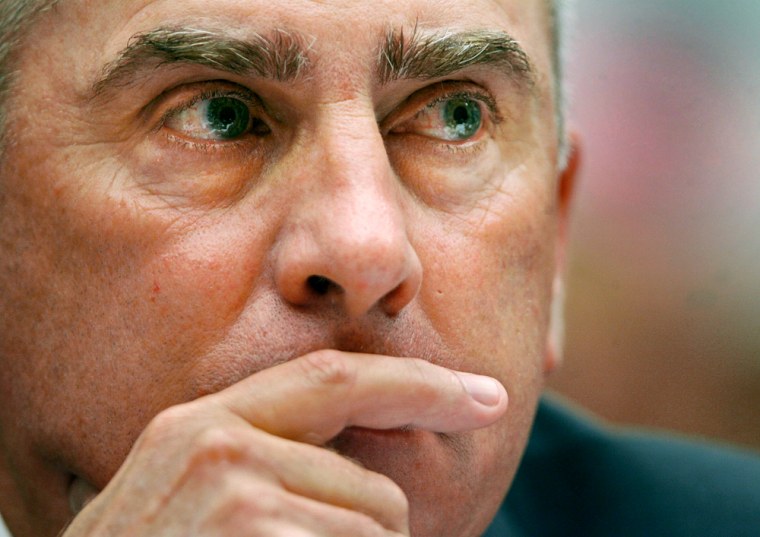It will take three to five years before Iraq’s government is stable enough to operate on its own, according to the former commander of U.S. forces in the Middle East, who said the surge of American forces has not succeeded in solving the country’s broader problems.
In an interview with The Associated Press, retired Army Gen. John Abizaid also said that beyond attacking the global threat of terrorism with military strength, the United States has done a poor job of applying the economic, political and diplomatic means to fight Islamic extremism in Iraq and elsewhere.
“I don’t blame it on any people,” Abizaid said Tuesday. “I just blame it on a bureaucratic system that has been unresponsive thus far to the challenges of the 21st century. We need to change that as a matter of national priority.”
Abizaid retired in May after nearly four years as the top officer at U.S. Central Command, the war-fighting organization based in Tampa, Fla. that oversees military operations in a region stretching from the Central Asia to the Horn of Africa. He was in Maryland to speak at a conference on military logistics.
The United States needs to draw down forces in Iraq so the Iraqis can take control of their own affairs, Abizaid said.
“I think in terms of time, Iraq stabilizes in the next three to five years,” Abizaid said. “That means we need to adjust our presence according to the security situation.”
Abizaid opposed to 'surge'
Abizaid would not assess Army Gen. David Petraeus’ handling of the war in Iraq, saying that as a former commander he never appreciated being critiqued on the decisions he made.
“The fact the Iraqis want us to go, we want to go, is one that none of us should ever lose sight of,” he said. “We’re trying to work ourselves out of a job. But we can’t do it in a way that destabilizes the country and allows precisely the worst thing to happen, which is the country becomes an even greater safe haven for extremist groups such as al-Qaida.”
While in uniform, Abizaid had been opposed to a “surge” of U.S. forces in Iraq because he believed that simply building up military strength wouldn’t solve the more deeply embedded problems.
“It was clear that putting additional troops in would gain temporary security,” he said. “What was not clear to me was what we were going to do diplomatically, economically, politically and informationally to make sure that we moved forward in a way that just wasn’t temporary.”
“And it appears to me, that those aspects, all designed to build better governments, haven’t necessarily achieved the effect that people would have hoped for,” he added.
Advice for next president
Abizaid said that none of the candidates hoping to replace President Bush can responsibly call for an immediate or complete withdrawal of American forces from Iraq and other trouble spots around the globe.
Too many other related issues are involved, he said, including the rise of Islamic extremism, the Arab-Israeli conflict, the proliferation of weapons of mass destruction, and the need to preserve the flow of oil from the Middle East. Abizaid called these major and pressing issues to be addressed.
“Any presidential candidate has got to face those facts as a matter of reality,” Abizaid said. “The United States is the most powerful nation on Earth and it just can’t walk away from the Middle East and central Asia and the Horn of Africa.”
In 2009, when there’s a new president, Abizaid said there will be an “opportunity to rebuild some of that international strength” that’s been lost since the war in Iraq began in March 2003.
But he declined to say how that global unity was lost.
“I’ll just say that over time, especially with regard to Iraq, it’s been very, very difficult to build an international consensus that was one that people could agree on,” Abizaid said.
Asked if any of the presidential candidates have sought his advice, he said he is “not a political guy” and doesn’t intend to become one. He did say, however, that he plans to speak frequently about the need to reform the U.S. government so it’s better able to deal with global challenges.
The 'Long War'
While at Central Command, Abizaid coined the phrase the “Long War,” a term intended to convey the lengthy struggle the United States is waging against Islamic extremism. But his replacement, Navy Adm. William Fallon, ditched the phrase shortly after taking over because he thought it suggested the United States would maintain a military significant presence in the Middle East indefinitely.
Well regarded for his knowledge of the region, Abizaid was considered a straight shooter during his time as Centcom chief. In July 2003, he was the first high-ranking officer to say publicly the war in Iraq had become a guerrilla war — a development that then-Defense Secretary Donald H. Rumsfeld and others had refused to acknowledge.
Since retiring, Abizaid was named a distinguished visiting fellow at the Stanford University’s Hoover Institution in California. He also has formed JPA Partners, a consulting company.
